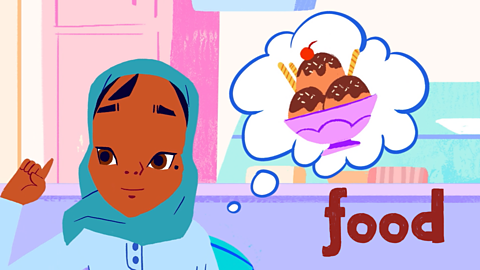Let's learn how to talk about who something belongs to.
When we talk about who something belongs to, we use words like:
Sorry, something went wrongCheck your connection, refresh the page and try again.
Sorry, something went wrongCheck your connection, refresh the page and try again.
Sorry, something went wrongCheck your connection, refresh the page and try again.
Sorry, something went wrongCheck your connection, refresh the page and try again.
Sorry, something went wrongCheck your connection, refresh the page and try again.
Sorry, something went wrongCheck your connection, refresh the page and try again.
Sorry, something went wrongCheck your connection, refresh the page and try again.
Key words
my, our
1 Sorry, something went wrongCheck your connection, refresh the page and try again.
2 Sorry, something went wrongCheck your connection, refresh the page and try again.
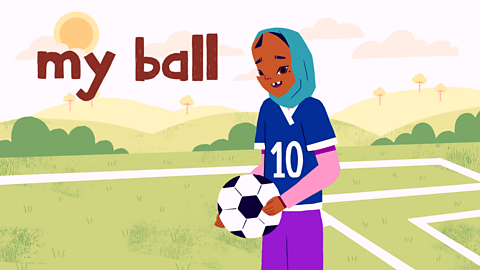
Image caption, 1. my ball
Image caption, 2. our ball
1 of 2
your
3 Sorry, something went wrongCheck your connection, refresh the page and try again.
4 Sorry, something went wrongCheck your connection, refresh the page and try again.
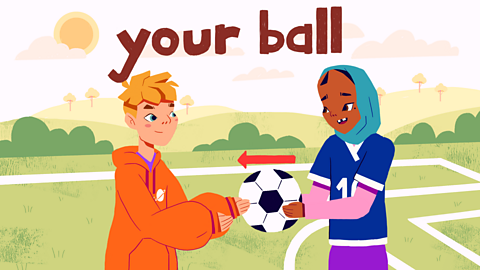
Image caption, 3. your ball
Image caption, 4. your ball
1 of 2
his, her, its, their
5 Sorry, something went wrongCheck your connection, refresh the page and try again.
6 Sorry, something went wrongCheck your connection, refresh the page and try again.
7 Sorry, something went wrongCheck your connection, refresh the page and try again.
8 Sorry, something went wrongCheck your connection, refresh the page and try again.
9 Sorry, something went wrongCheck your connection, refresh the page and try again.
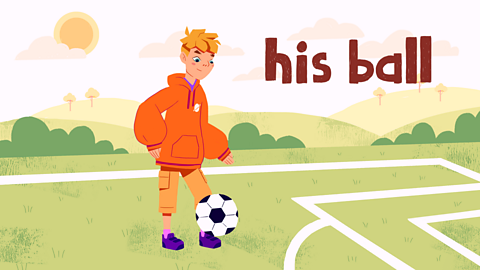
Image caption, 5. his ball
Image caption, 6. her ball
Image caption, 7. its ball
Image caption, 8. their ball
Image caption, 9. their ball
1 of 5
Grammar explained
These words are called possessive adjectives:
When an object only belongs to one person we use a singular possessive adjective.
When an object belongs to more than one person we use a plural possessive adjective.
| Subject | Possessive adjective | Singular, plural or both? | |
|---|---|---|---|
| 1st person | Sorry, something went wrongCheck your connection, refresh the page and try again. | Sorry, something went wrongCheck your connection, refresh the page and try again. | singular |
| Sorry, something went wrongCheck your connection, refresh the page and try again. | Sorry, something went wrongCheck your connection, refresh the page and try again. | plural | |
| 2nd person | Sorry, something went wrongCheck your connection, refresh the page and try again. | Sorry, something went wrongCheck your connection, refresh the page and try again. | both |
| 3rd person | Sorry, something went wrongCheck your connection, refresh the page and try again. | Sorry, something went wrongCheck your connection, refresh the page and try again. | singular |
| Sorry, something went wrongCheck your connection, refresh the page and try again. | Sorry, something went wrongCheck your connection, refresh the page and try again. | singular | |
| Sorry, something went wrongCheck your connection, refresh the page and try again. | Sorry, something went wrongCheck your connection, refresh the page and try again. | singular | |
| Sorry, something went wrongCheck your connection, refresh the page and try again. | Sorry, something went wrongCheck your connection, refresh the page and try again. | both |
Their
Sorry, something went wrongCheck your connection, refresh the page and try again. can be used in a few different situations:
- When we know something belongs to a group of people
Sorry, something went wrongCheck your connection, refresh the page and try again.
When we don’t know who something belongs to
Sorry, something went wrongCheck your connection, refresh the page and try again.
Instead of saying his or her
Sorry, something went wrongCheck your connection, refresh the page and try again.
Activities
Matching activity
Who does the Sorry, something went wrongCheck your connection, refresh the page and try again. belong to?
Say each phrase out loud and click on its matching picture.
Listening activity
Watch Jess talking about her family.
As you watch, listen out for the belonging words you've just learnt:
my / your / his / her / its / our / their
Filip: Is this your family?
Jess: Yes, this is my family on Christmas Day.
Nazia: Oh yeah… there’s your mum.
Filip: Who are the old people?
Jess: ∞’≥Û≤π≥Ÿ‚Äôs my grandmother and grandfather - my mum‚Äôs parents.
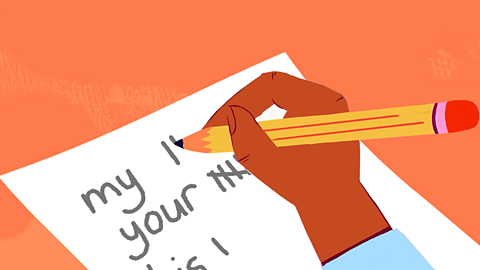
Now watch it again to answer these questions:
How many different belonging words can you hear?
How many times can you hear each one?

You might need a pencil and paper to help you.
| Word | Number of times heard |
|---|---|
| Sorry, something went wrongCheck your connection, refresh the page and try again. | 3 |
| Sorry, something went wrongCheck your connection, refresh the page and try again. | 2 |
| Sorry, something went wrongCheck your connection, refresh the page and try again. | 0 |
| Sorry, something went wrongCheck your connection, refresh the page and try again. | 0 |
| Sorry, something went wrongCheck your connection, refresh the page and try again. | 0 |
| Sorry, something went wrongCheck your connection, refresh the page and try again. | 0 |
| Sorry, something went wrongCheck your connection, refresh the page and try again. | 0 |
Filip: Sorry, something went wrongCheck your connection, refresh the page and try again.
Jess: Sorry, something went wrongCheck your connection, refresh the page and try again.
Nazia: Sorry, something went wrongCheck your connection, refresh the page and try again.
Filip: Sorry, something went wrongCheck your connection, refresh the page and try again.
Jess: Sorry, something went wrongCheck your connection, refresh the page and try again.
Make a sentence
Say who something belongs to
Look at this classroom picture:
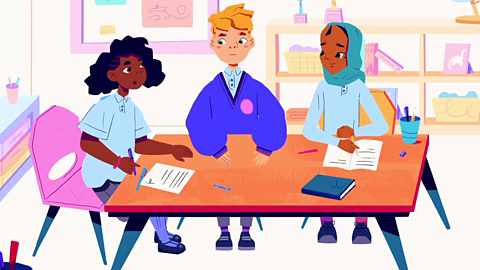
Now point and describe who each object belongs to, using:
Sorry, something went wrongCheck your connection, refresh the page and try again.
+
my / your / his / her / its / our / their
+
Sorry, something went wrongCheck your connection, refresh the page and try again.

Sorry, something went wrongCheck your connection, refresh the page and try again.

Sorry, something went wrongCheck your connection, refresh the page and try again.
or
Sorry, something went wrongCheck your connection, refresh the page and try again.
Sorry, something went wrongCheck your connection, refresh the page and try again.
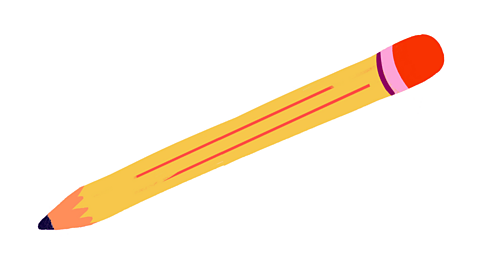
Sorry, something went wrongCheck your connection, refresh the page and try again.

Sorry, something went wrongCheck your connection, refresh the page and try again.
or
Sorry, something went wrongCheck your connection, refresh the page and try again.
Sorry, something went wrongCheck your connection, refresh the page and try again.
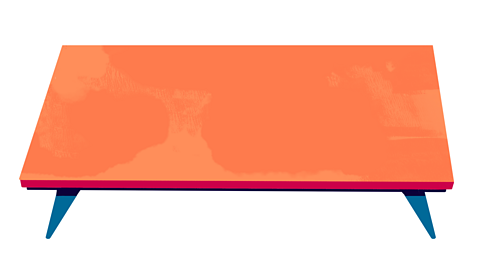
Sorry, something went wrongCheck your connection, refresh the page and try again.

Sorry, something went wrongCheck your connection, refresh the page and try again.

Ask who something belongs to
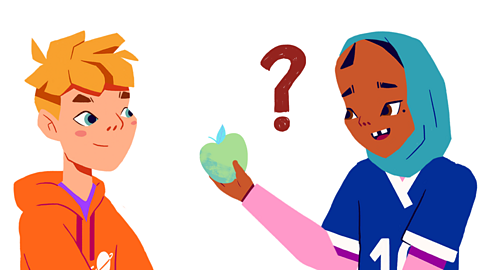
- To ask if something belongs to someone, you can say:
Sorry, something went wrongCheck your connection, refresh the page and try again.
Example:
Sorry, something went wrongCheck your connection, refresh the page and try again.

Try to make sentences using:
Sorry, something went wrongCheck your connection, refresh the page and try again.

- Sorry, something went wrongCheck your connection, refresh the page and try again.
- Sorry, something went wrongCheck your connection, refresh the page and try again.
- Sorry, something went wrongCheck your connection, refresh the page and try again.
- Sorry, something went wrongCheck your connection, refresh the page and try again.
- Sorry, something went wrongCheck your connection, refresh the page and try again.
- Sorry, something went wrongCheck your connection, refresh the page and try again.
- Sorry, something went wrongCheck your connection, refresh the page and try again.

Ask where something is

- To ask where something is, you can say:
Sorry, something went wrongCheck your connection, refresh the page and try again.
Example:
Sorry, something went wrongCheck your connection, refresh the page and try again.

Try to make sentences using:
Sorry, something went wrongCheck your connection, refresh the page and try again.

- Sorry, something went wrongCheck your connection, refresh the page and try again.
- Sorry, something went wrongCheck your connection, refresh the page and try again.
- Sorry, something went wrongCheck your connection, refresh the page and try again.
- Sorry, something went wrongCheck your connection, refresh the page and try again.
- Sorry, something went wrongCheck your connection, refresh the page and try again.
- Sorry, something went wrongCheck your connection, refresh the page and try again.
- Sorry, something went wrongCheck your connection, refresh the page and try again.
More on English as an additional language
Find out more by working through a topic
- count14 of 14
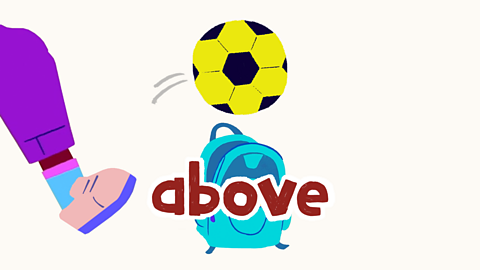
- count2 of 14

- count3 of 14
